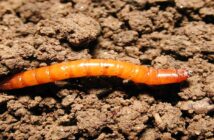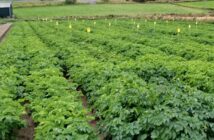With winter drilling interrupted by storms, a larger than average spring crop acreage is being forecast and nearly all certified spring cereal seed has been sold.
Unless a window opens for late-drilled winter crops, this will mean that many have to look to farm-saved seed to source spring cereals.
“We’re expecting farm-saved spring seed use to be up massively on farm, especially spring barley,” said Agrii farm-saved seed business manager Mark Taylor. “Treatment demand could be up by 30-40% on a typical spring cereal season.”
Those hoping to use grain from their store are strongly advised to get a full germination test and indicate to the lab where glyphosate may have been applied as a desiccant. While this is far from ideal, abnormal seedlings can be compensated by increasing the seed rate.
When it comes to seed treatments in either certified or farm-saved spring barley, Agrii seed technical manager David Leaper suggests that two diseases drive the choice: loose smut and seed-borne net blotch.
“Over the past five to six years there is evidence to suggest a loss of prothioconazole sensitivity to loose smut,” he said.
Coupled with the loss of approval for some actives, Agrii has now transitioned away from prothioconazole-based seed treatments to Rancona i-Mix (ipconazole + imazalil).
“There’s clear evidence to show that the level of loose smut activity you get from ipconazole is better than prothioconazole,” Mr Leaper said. “So that puts Rancona i-Mix as the top technical treatment for control of loose smut, which is the key priority disease in spring barley.”
Another concern is seed-borne net blotch. “You can get degrees of varietal resistance to net blotch from resistant or moderately resistant to susceptible, and while crops can pick up net blotch from green bridges and transfer from stubbles, we know the seed-borne route is quite important.
“Our trials at Agrii Focus have shown that the ipconazole / imazalil combination has the best control of seed-borne net blotch, so those two diseases are the reason for choosing Rancona i-Mix.”
Mr Leaper added that leaf stripe can also be controlled using this treatment, although it is rarely picked up in tests. Fusarium and Microdochium nivale tend to be less of a problem in a spring crop drilled into warming soils.
If growers are considering not using a single-purpose seed treatment, he recommended a seed test to check for disease. Around 14% of farm-saved spring barley is not treated with fungicidal seed treatments and these will be at the most risk. “You can go from trace levels or no apparent disease, with something like loose smut, to significant crop effects within three seasons, if you’re using non-treated seed without testing.”
Even if the seed has been treated, it could still be worth considering getting it tested. “If your certified seed was supplied with Beret Gold (fludioxonil), which is a good treatment for seedling blights but has very little activity against loose smut, you probably want to get it tested, if you’re considering not treating.”
While Rancona i-Mix has lost its approval in the EU, it is still fully approved and available across mainland Great Britain, confirms Jo Hawke, UPL trials manager. “It’s approved for both spring barley, including for malting barley, and spring wheat. We have enough supply to meet the increased demand we expect ahead of this spring’s plantings.”




